What is a Shutterstock Contributor?
Shutterstock is a platform where anyone can start selling their creative content. The company was founded back in 2003 when programmer and photographer Jon Oringer launched the site and uploaded several tens of thousands of his own photos. Later, he opened the platform to other photographers as well.
That’s how the 22-year-long story of one of the world’s largest stock platforms began. However, in 2025, following a merger between Shutterstock and Getty Images (another major stock agency), the resulting parent company became Getty Images Holdings.
Although the Shutterstock brand still exists as of 2025, it is expected to be phased out once all formalities are completed. That said, it’s likely the website will continue to operate under the Shutterstock name, at least for now.
But let’s clarify one common point of confusion: what’s the difference between the Shutterstock website and the Shutterstock Contributor platform? I’ve seen more than a few cases where photographers looking to sell their images accidentally register as buyers on Shutterstock, rather than signing up on the Shutterstock Contributor site.
They then get confused by the pricing they see on the site and wrongly assume they need to pay something in order to start selling their work.
But that’s not how it works—if you want to sell your content (whether it’s photos or videos), you don’t pay anything. It’s the buyers who pay when they want to license content created by photographers and other creators.
So, if you're just starting out as a Shutterstock contributor, make sure to head to the correct site: Shutterstock Contributor.
How to Register on Shutterstock platform for sellers
Go to: https://submit.shutterstock.com/ and click “Get Started”.
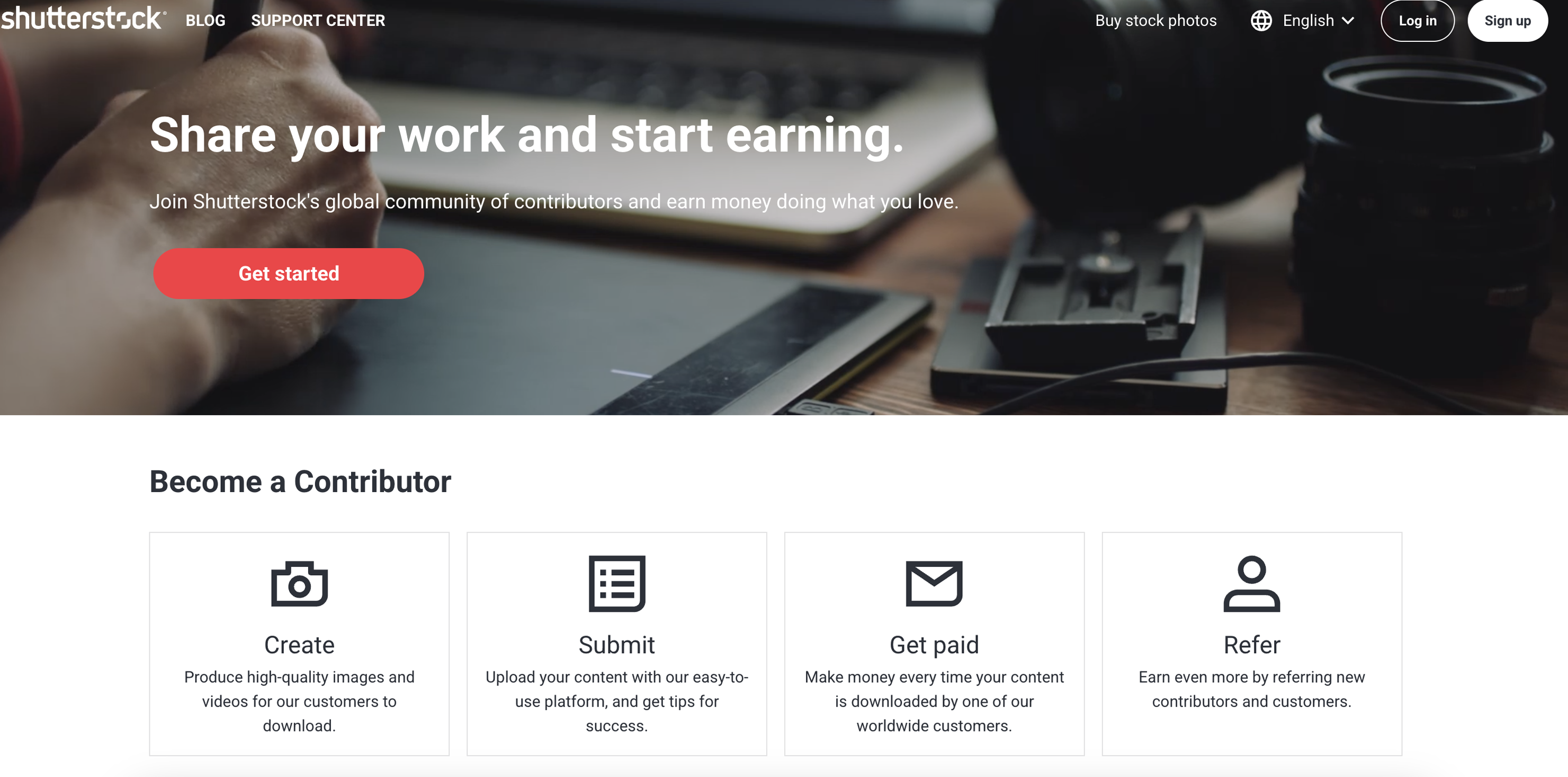
Click “Sign Up” and create an account (you’ll need an email and password).
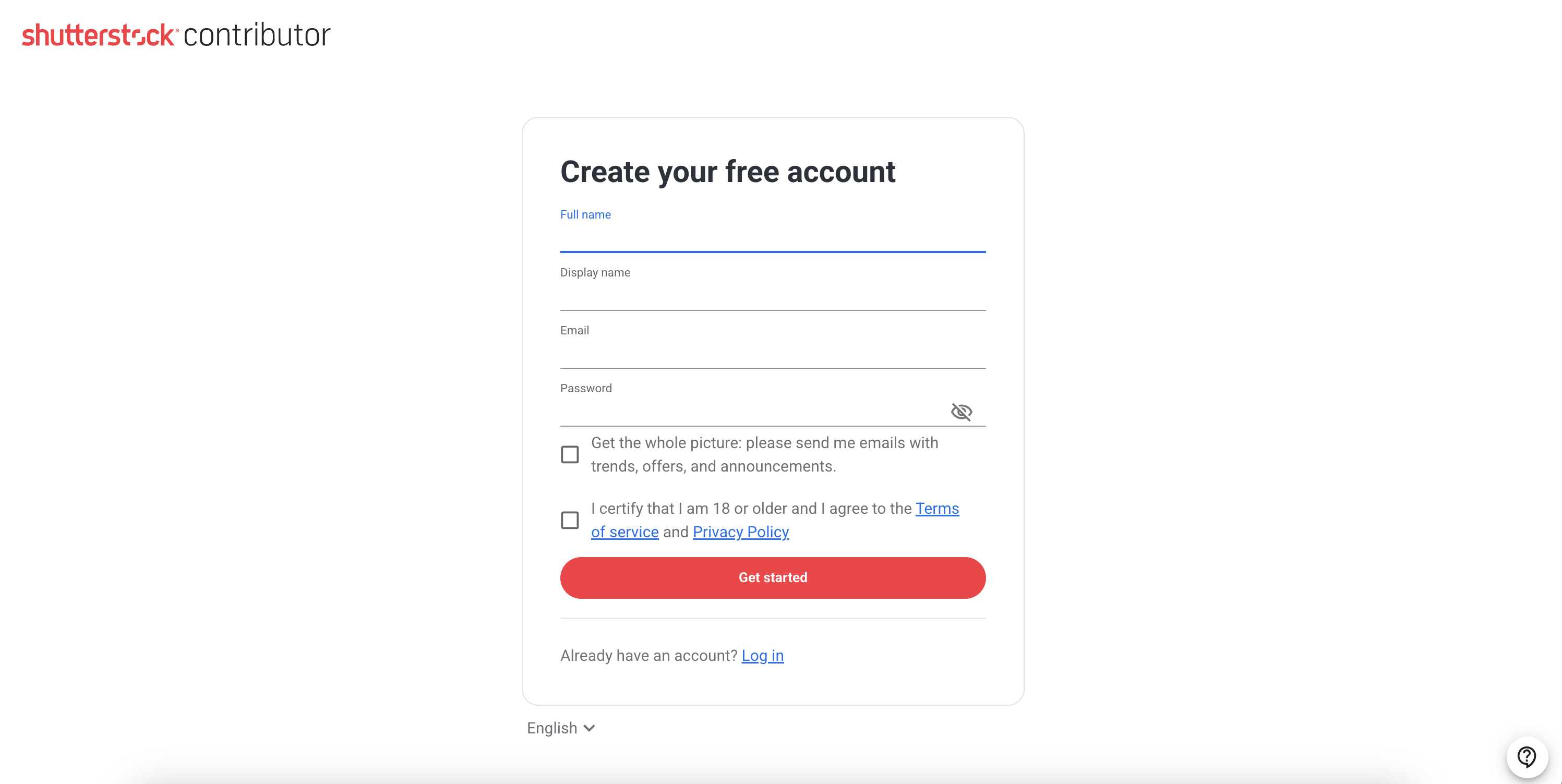
Enter your name, country of residence, and agree to the terms and conditions.
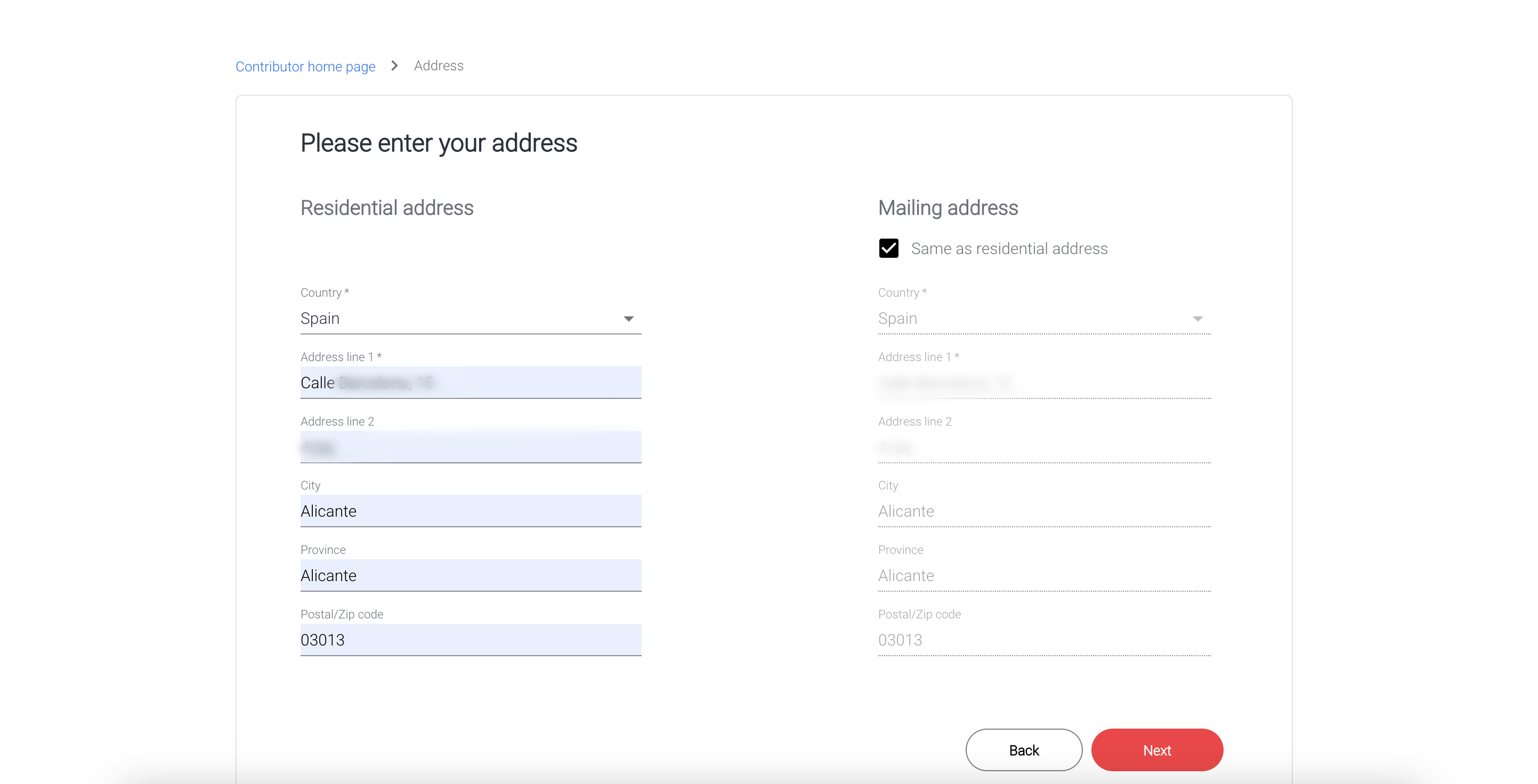
Check your inbox for a confirmation email—click the link inside to verify your account.

And that’s it! Your Shutterstock Contributor account is now ready.
Important: you must be at least 18 years old and hold all rights to the content you plan to upload.
You can also download the Shutterstock Contributor mobile app to upload and track your stats from your phone.
Next, you can begin uploading your work for your first review. Yes, stock platforms do have a review system—inspectors check if your photos meet the site’s guidelines. But you can also skip uploading for now and explore your dashboard to get a feel for how Shutterstock Contributor works from the inside.
Shutterstock Contributor Dashboard Overview
Once logged in, you’ll land on your dashboard. I recommend starting by exploring the left-hand menu, where you’ll find sections like: earnings, portfolio, and insights.
The “Earnings” tab is a favorite among many stock contributors—especially the “Earnings Summary” section. This is where all your sales will appear, whether it’s vectors, videos, or photos.
Next up is the “Portfolio” tab, equally important. This is where you upload your files, and where you can track what’s been approved, rejected, or is still under review.
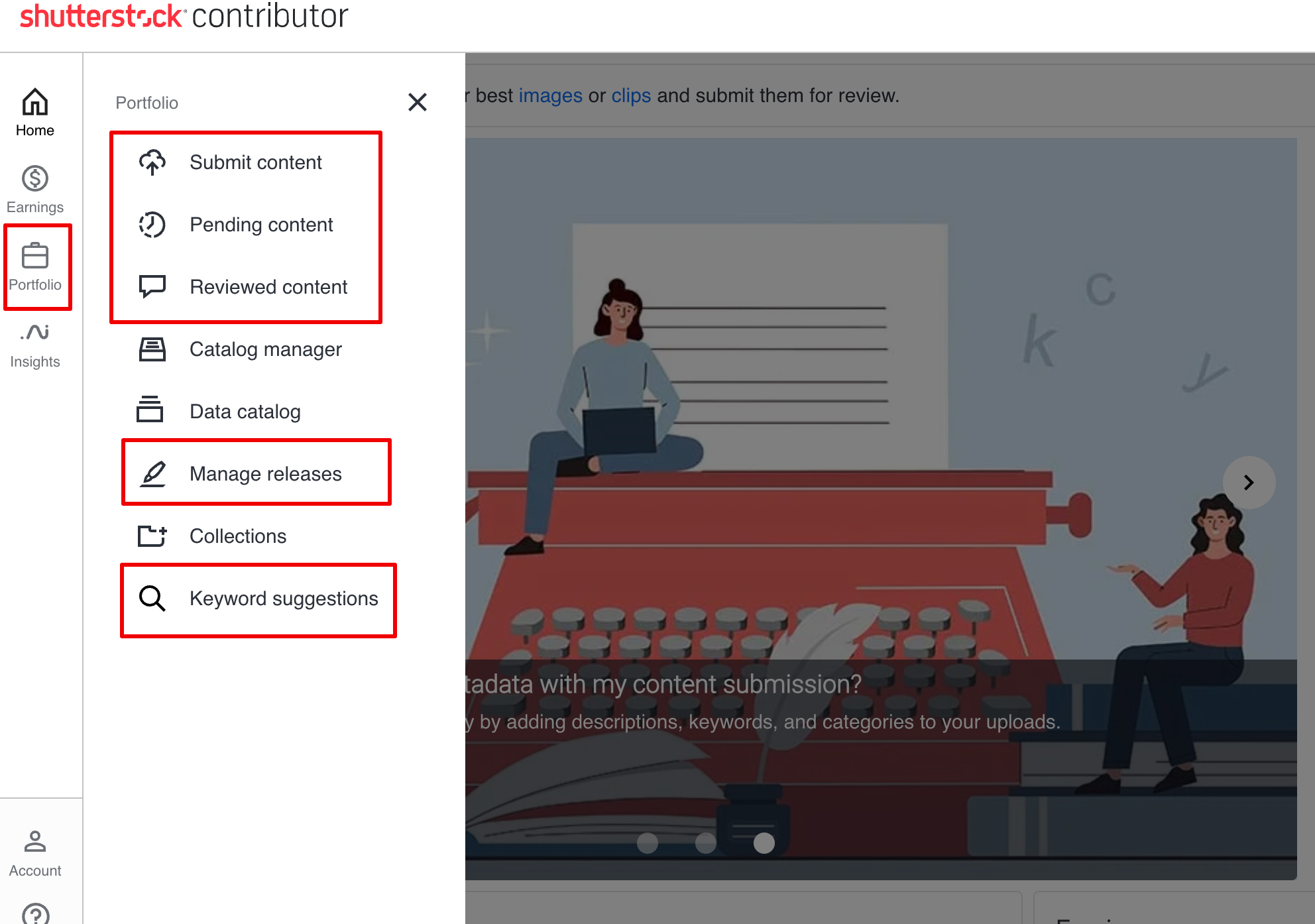
Also in this section, you’ll find the area for managing releases—without these, you can’t upload commercial content featuring people. You’ll also see a very handy tool: the “Keyword Suggestion” feature (I’ve covered this in detail in another article).
Scroll a bit further down and you’ll see a world map (which will stay blank until you make your first sale). But don’t worry—Shutterstock isn’t trying to teach you geography. Once you make a sale, little blue dots will appear on the map showing where your images were purchased. Hover over one, and you’ll see a preview of the exact image that was sold.
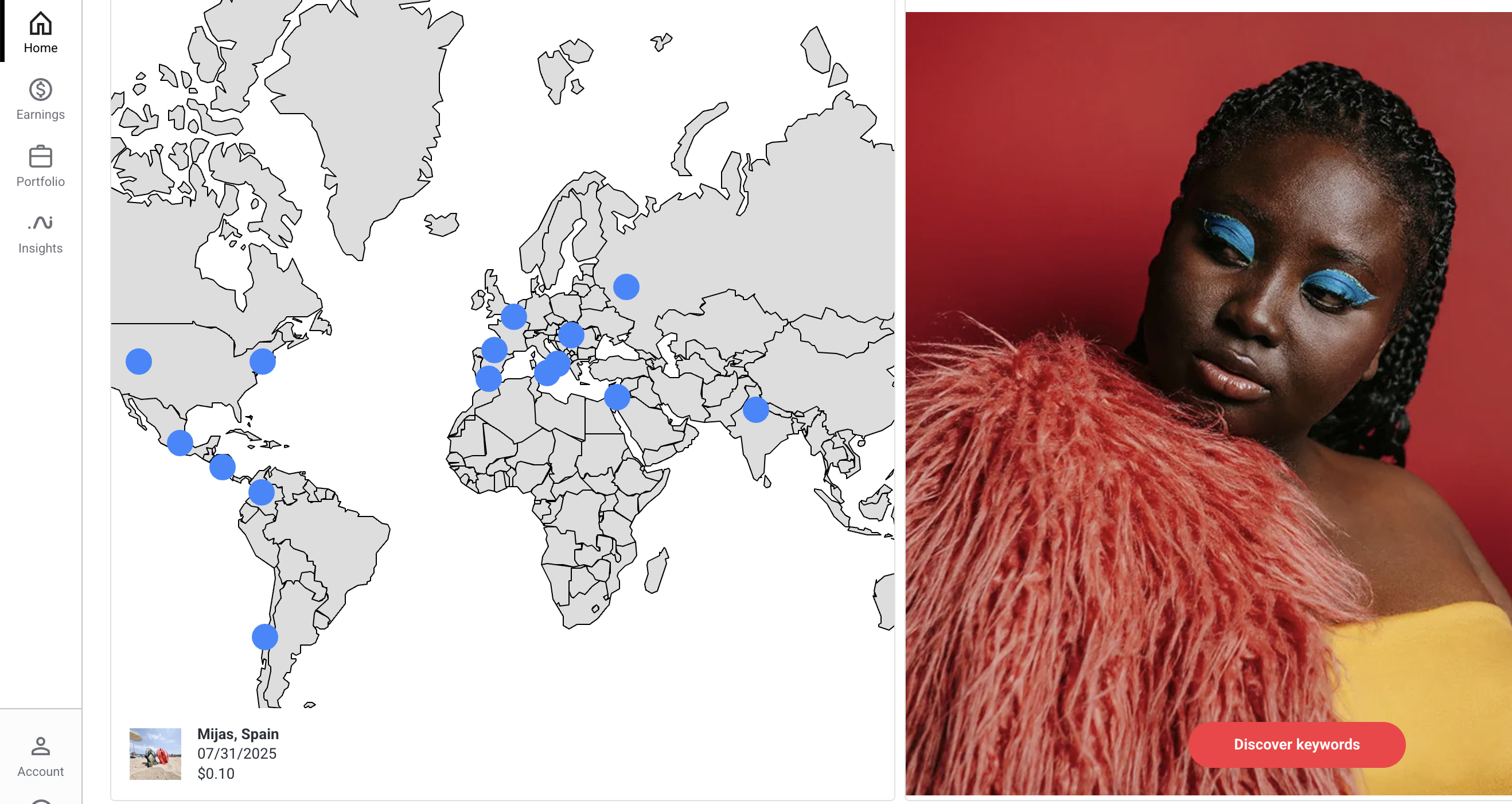
Shutterstock Contributor Earnings Levels
In May 2020, Shutterstock announced a new contributor payout model. Since then, your income as a Shutterstock contributor depends on which level you’re on.
For example, if you sell fewer than 100 images from January 1st onwards, you’ll earn just 10% of what the buyer pays for each downloaded file.
But the more content you sell, the higher your earnings percentage becomes. Throughout the year, contributors move up this “ladder.” Naturally, the more content you have, the faster you’ll climb.
Here’s what the image payout table looks like (video payouts follow a similar structure, but the thresholds for leveling up are 5–10 times lower).
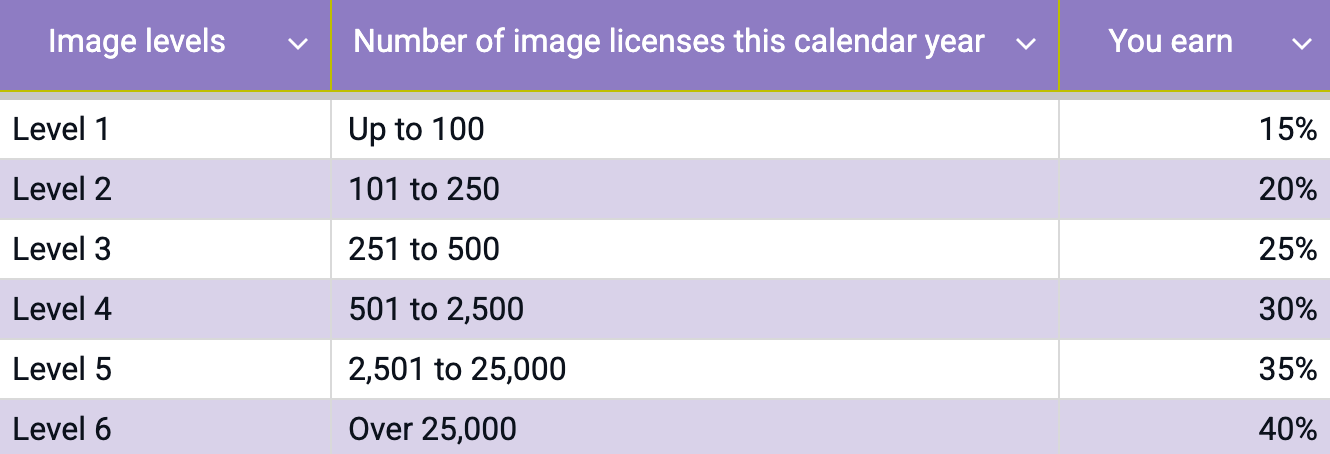
The contributor level resets every year on January 1st, and earnings level start fresh.
What Do These Earnings Columns Mean?
When your first sales come in, the “Earnings” section will show a breakdown with columns for photos and videos. New contributors often get confused about the difference between categories like “Subscription” and “Enhanced” (for photos), or “Cart Sales” and “Clip Packs” (for videos).

Here’s a quick rundown of what each earnings category means:
-
Subscriptions – These are subscription-based sales. Buyers pay for a monthly or yearly plan and download files within a set limit. The total cost of their plan is divided by the number of files downloaded—your share is a percentage of that per-file amount.
-
On Demand – Also a type of subscription, but buyers can download images at any time throughout the year after paying a one-time fee (usually $49 or $229 depending on volume and size). These usually pay more than standard subscriptions.
-
Enhanced – These are extended license sales. Buyers get broader usage rights—such as the ability to use your photo in large print runs or commercial merchandise. Payouts here can reach $20–50 per sale.
-
Single & Other – This catch-all category includes single purchases, partner program sales, and purchases made through enterprise accounts. Shutterstock doesn’t clarify exactly what’s included here.
-
Clip Packs – Customers purchase bundles of videos (e.g. 5 or 10 clips for a fixed price). Contributor payouts are generally higher here, especially for HD and 4K content.
-
Cart Sales – These are one-time purchases made directly through the cart. These sales are rare, but can bring in decent earnings due to higher pricing.
What You Can Upload—and What Actually Sells
Shutterstock accepts the following types of content:
-
Photos – from product photography to lifestyle. You can shoot with a pro camera or a smartphone. Subjects can range from a pimple on a nose to a panoramic mountain view. Shoot what’s accessible to you.
-
Vector Files – .EPS format illustrations. These are more advanced, since you need to know tools like Adobe Illustrator or Inkscape.
-
Videos – Shoot with a camera or a phone. Aerial drone footage performs especially well—some contributors earn $3,000–$5,000 per month with it.
Just make sure your files meet the Shutterstock Contributor requirements.
Note: AI-generated content is not allowed. Some images on Shutterstock are marked “AI,” but these are uploaded by Shutterstock AI itself. Only the platform can upload such content.

So, in the Adobe Stock vs Shutterstock Contributor comparison, this point definitely goes to Adobe. I talked more about selling MidJourney-generated images in this article.
Rights and Releases
If you plan to sell photos or videos that include people or private property, you’ll need:
I won’t go into detail on this topic—it’s better if you check out the excellent guide on releases prepared by the Shutterstock team.
The only exception where you’re allowed to upload content featuring people, private property, or even brands is if you mark your content as “editorial.” Editorial photos and videos actually sell quite well. I covered more about editorial content in this article.
How Much Do Shutterstock Contributors Earn?
A contributor with 1,000 quality photos can earn $50–300 per month. With 10,000 files — $300–2,000 and up. It all depends on your content quality and how well it's tagged.
If you want to improve your tagging and meet stock platform standards, try my tool: TagWithAI. You can use it to describe up to 10 files for free.
Here’s what sales look like in one of my older portfolios—some photos there are over 10 years old!

I stopped uploading commercial work to Shutterstock Contributor in 2023, focusing entirely on generative content (which Shutterstock doesn’t accept). But in spring 2025, I returned—with a new focus on editorial photos taken during my walks around town or through stores.
And despite Shutterstock’s modest average payouts, it still surprises me occasionally—like when someone bought my old burger photo for $85.

There’s also a special program called Shutterstock Contributor Data Licensing. Even if your images aren’t accepted for sale, you can still allow them to be included in Shutterstock’s AI training dataset. In that case, you may become eligible for the annual bonuses Shutterstock pays out to contributors who’ve granted permission for their work to be used in AI training.
Check your Shitterstock autor settings to see if you’ve allowed your content to be used for AI training.
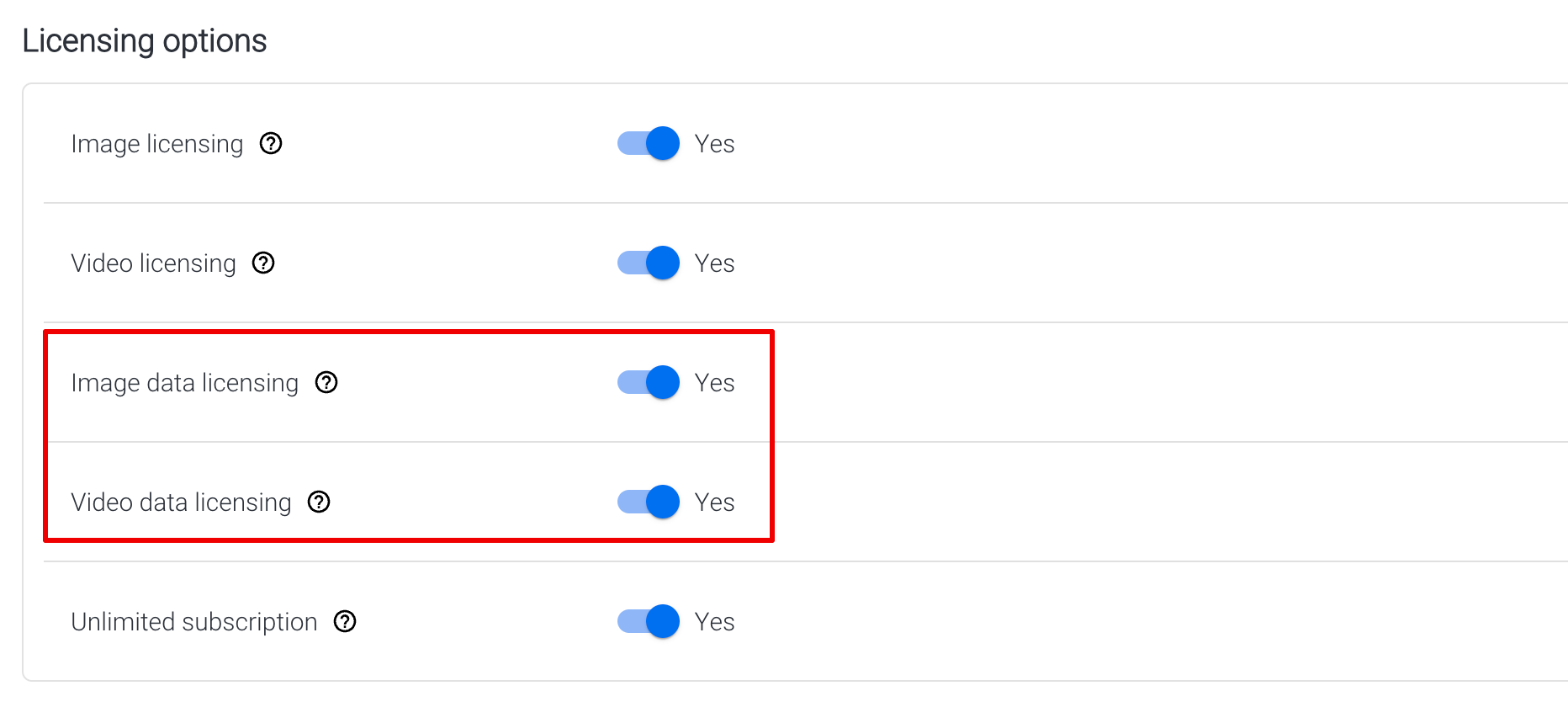
Conclusion
Becoming a Shutterstock Contributor is a way to earn from your creativity. The journey may start small, but with consistency and the right strategy, you can build a stable passive income.
And you’re not limited to Shutterstock—you can upload the same content to other stock platforms too. I shared how to do that on Adobe Stock in a separate article: Five best websites to sell photos.





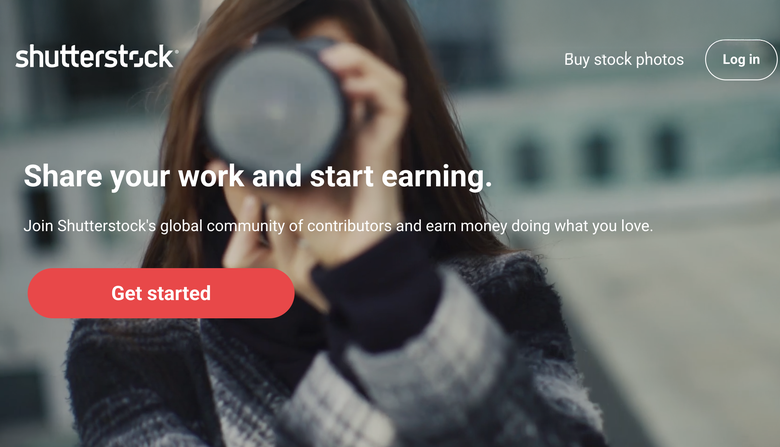











No comments yet.